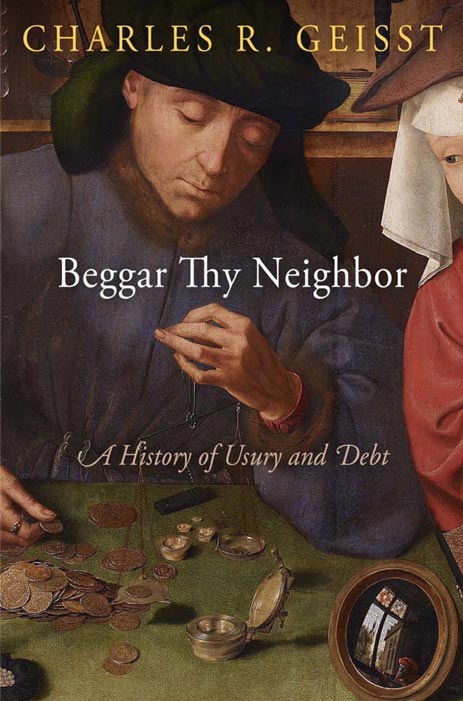 Beggar Thy Neighbor Beggar Thy Neighbor
A History of Usury and Debt
Charles R. Geisst
Narrated by Maxwell Zener
Available from Audible
Book published by University of Pennsylvania Press
The practice of charging interest on loans has been controversial since it was first mentioned in early recorded history. Lending is a powerful economic tool, vital to the development of society but it can also lead to disaster if left unregulated. Prohibitions against excessive interest, or usury, have been found in almost all societies since antiquity. Whether loans were made in kind or in cash, creditors often were accused of beggar-thy-neighbor exploitation when their lending terms put borrowers at risk of ruin. While the concept of usury reflects transcendent notions of fairness, its definition has varied over time and place: Roman law distinguished between simple and compound interest, the medieval church banned interest altogether, and even Adam Smith favored a ceiling on interest. But in spite of these limits, the advantages and temptations of lending prompted financial innovations from margin investing and adjustable-rate mortgages to credit cards and microlending.
In Beggar Thy Neighbor, financial historian Charles R. Geisst tracks the changing perceptions of usury and debt from the time of Cicero to the most recent financial crises. This comprehensive economic history looks at humanity's attempts to curb the abuse of debt while reaping the benefits of credit. Beggar Thy Neighbor examines the major debt revolutions of the past, demonstrating that extensive leverage and debt were behind most financial market crashes from the Renaissance to the present day. Geisst argues that usury prohibitions, as part of the natural law tradition in Western and Islamic societies, continue to play a key role in banking regulation despite modern advances in finance. From the Roman Empire to the recent Dodd-Frank financial reforms, usury ceilings still occupy a central place in notions of free markets and economic justice.
Charles R. Geisst is Ambassador Charles A. Gargano Professor of Finance at Manhattan College and the author of many other books, including Collateral Damaged: The Marketing of Consumer Debt to America and Wall Street: A History.
REVIEWS:
“Beggar Thy Neighbor starts with Marcus Junius Brutus, a predatory lender infamous for his role in the assassination of Julius Caesar, ends with the aftermath of the 2008 financial crisis, and provides a lively social-cum-cultural history of debt for the intervening two millennia.”
—Journal of Economic History “Geisst tackles this double-edged, troublesome topic not from a personal level—you won't find 10 tips to reduce personal debt here—but from a historical and practical level. He starts from before banks even existed, with a debate that continues today over interest rate ceilings, and it's evident that we are indebted to religious institutions, both Catholic and Jewish, for the foundational practices of money handling, borrowing, loaning, and repaying.”
—Publishers Weekly “A useful introduction to the Christian and Muslim disdain for usury and raises important questions about the prevalence of debt in our economy. Geisst proves that legal, moral, and economic debates over usury and debt are here to stay.”
—The Historian “Fascinating and comprehensive.... The broad historic sweep that [Geisst] brings to this study impresses.”
—EH.Net “A compelling book not only for history buffs but also for financial market participants who will find that events today have a long history leading up to our current travails.”
—Henry Kaufman, author of On Money and Markets: A Wall Street Memoir “Charles R. Geisst takes us on a splendid tour of the law of usury from ancient times to the present. Along the way one encounters Cicero, Charlemagne, Shakespeare, Adam Smith, Karl Marx, Michael Milken and many others in this engaging yet critical account of what may well be the oldest and most ubiquitous form of economic regulation. Highly recommended both for the lay reader interested in economic affairs and the academic specialist in money and banking.”
—Hugh Rockoff, Rutgers University “An engaging, comprehensive history of the concept of interest and usury.”
—Robert Wright, Augustana College, South Dakota
|

